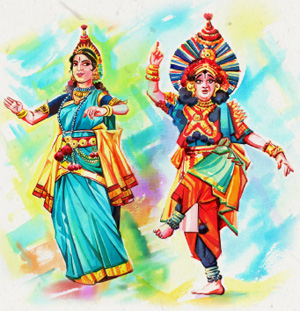About Us
BUNT COMMUNITY
Bunts, Nadavas are also known as Vokkelakulu of Tulunadu is a fascinating and vibrant community, spilled all over the world now. Their root is firmly entrenched in the undivided Dakshina Kannada. Tulunadu stretched roughly from Ankola in Uttara kannada district to Neeleshwar and beyond Payyanur in Kerala.


Piecing together the available information and dovetailing it with caution, we can infer the powerful Bunts or Thulava households were feudatories to independent kingdoms such as Alupas, Pallavas, Kadambas, Kalachurys and Hoysalas who held away over the area from time to time. The incessant wars waged between kings gave rise to a class came to be known as Bhatas, meaning valliant fighters, gradually became Bunts. Bunts were also agriculturists, who maintained servants to work for them.
There is a reference to people from Tulunadu in ancient Greek texts and historical references to Alva clans in Tulunadu way back in 150 AD. The heritage of Bunts history was also mentioned in the book “South Indian Castes and tribes” written by an historian, Mr. E. Thurston. It talks about Nadavas in South Kanara and has briefly mentioned the subdivisions of Bunts, like Mosadika, Nadavas or Nada Bunts, Pariwara Bunts and Jain Bunts.
Bunts ruled over Tulunadu till the end of 11th centuary though kingdoms rose and fell intermittently, Bunts held sway over the administration due to their leadership ability and intelligence. Adapting quickly to the changing situation, Bunts took to farming of the lands. Thus slowly Bunts became landlords.
The religious customs and practices during important occasions are performed as per custom by Gurikars are elders. Aliyasanthana are Aliya Kattu which is exclusive to the community accords predominance to elder female member of the family.
Bunts have preserved traditional and cultural values of life. It may be in the form of Bhutharadhane, Nagamandala, Thambila festival and practices family traditions and adherence to customs.


Yakshagana, a fabulously costumed dance drama and Kambala, the buffalo race, are some of the past time of bunts.
The fast changing phenomenon has gripped Bunts as well. We can spot Bunts not only in many cities of India, but in any part of the world as well. Bunts are contributing their mite in every sphere of activity- name any specialized field, be it Medicine, Engineering, Social Science, Research, Law, Hospitality Industry- there is Bunt heading the group.

